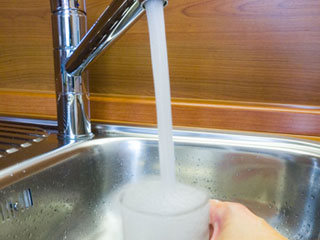Many drinking water treatment plants throughout Ireland are in poor condition and facing failure according to Irish Water. Because of stringent new quality guidelines, water is now tested up to six times a year and Irish Water intends to shut down plants and issue boil-water notices if problems emerge. This is unlike how water treatment plants operated in the past, where boil-water notices were implemented after problems were discovered. For many homes in rural areas, a home water filter system would be a good investment in improving the quality of drinking water as well as a safeguard if and when boil water notices are issued. Read More…
Author Archives: Admin
Antibiotics in Tap Water A Growing Concern For Ireland
A new research report from the Irish EPA (Environmental Protection Agency) shows how antibiotics are getting into the environment, particularly water sources and looks at the possible effects of antibiotics in the environment on human health. It is now commonplace for antibiotics to fail or not work as intended, which was unheard of 20 years ago. The immediate public health concern discussed in the report, considers the effect of antibiotics in water and how microbes in water change to become more antibiotic resistant.
The increased use of antibiotics is influenced by an increasing and aging population, longer survival of people with complex illnesses, changes in food production systems, farming practices and other social and economic factors. Effluent from hospitals can be heavily contaminated with antibiotics and pathogens. Modern farming practices rely heavily on antibiotics, used as preventative medication to keep animals alive and healthy in confined spaces such as in intensive dairy farms, piggeries, broiler houses, poultry farms and anywhere animals are confined in close cramped conditions. The antibiotics are usually included in processed animal feed or administered directly into farm animals such as dairy cows in large dairy herds. Animal waste from chickens, cows and pigs in confined conditions includes a number of potentially harmful pollutants including nitrogen, phosphorus, antibiotics, pathogens and hormones. For people living in rural areas such as the Golden Vale and other intensive farming areas, an effective home water filtration system is a great way to protect home drinking water from water borne contamination including antibiotics previously used to treat animals or humans.
The new report from the Irish Environmental Protection Agency is entitled “Hospital Effluent: Impact on the Microbial Environment & Risk to Human Health” and it goes into great detail on the threat to Irish water by antibiotic-resistant bacteria…Read More
Fluoride in Water Suspected of Causing Birth Defects
According to a report in Donegal Now, Fluoride in water supplies is now suspected of causing birth defects. The report also states that Donegal County Council has joined a number of other Irish County Councils to pass a motion calling on the Government to stop treating drinking water with fluoride. The Fluoride Free Towns group is advising the general public to reduce their daily intake of fluoride to zero until a safety threshold has been determined and are especially recommending expectant mothers to avoid all sources of fluoride to ensure their child when born does not suffer from fluoride induced birth defects. For water supplies that are treated with fluoride, installing a point-of-use or a whole-house water filter system will reduce or eliminate the fluoride depending on the type of filter used…Read More
Limerick Water Users Not Consulted in Chemical Trial
It has been claimed that Limerick Water users are being treated like Guinea Pigs in the use of Orthophosphate in their water supply. The use of Orthophosphate dosing in treating water is controversial due to the possible human side effects and damage to the environment such as increased algae growth in rivers and lakes. Orthophosphate dosing has proved effective in reducing lead in water by coating the pipes which helps reduce the levels of lead being dissolved into the water…Read More
Limerick To Trial Orthophosphate in Drinking Water Supplies

Limerick has been chosen as the test site by Irish Water to use a chemical called Orthophosphate which is hoped will reduce the amount of lead leaking into the city’s drinking water supplies. While the Environmental Protection Agency (EPA) recommends lead in the water should be combated by replacing the lead piping, it has acknowledged adding Orthophosphate to the supply could be a temporary solution. A safer solution is to add a filtration system to remove lead and other metals from drinking water. Limerick was chosen because it is on the Shannon estuary and not near fresh water bodies. The chemical Orthophosphate is classified as a phosphate (as in fertilisers) and can cause blue-green algae blooms in fresh water, a phenomenon that is already occurring on Lough Derg due to the over-use of fertilisers and subsequent run-off from farm land. Blue-green algae blooms in fresh water can produce potentially toxic cyanobacteria, which is a threat to human health. Pets and wildlife can die as a result of drinking water contaminated with cyanobacteria from algae blooms. In humans, contaminated water can cause acute stomach illness and skin rashes. With algae growth only set to rise, thanks in part to global climate change and the over-use of fertilisers in farming, the impact of its growth on human drinking water is a growing concern. Because Limerick is on an estuary, Irish Water say it is safe to add it to the city water supply…Read More (PDF)
Irish Bottled Water Brand Off Shelves Due To Quality Issues
An Irish bottled water brand is no longer available on the shelves of a major retailer in Ireland due to off-water odour complaints according to a report in the Irish Times of July 31st 2015. It has been known for some time that chemicals can leech into the water from the plastic in plastic water bottles. In fact, drinking water from plastic bottles may be hurting your health.
If water is stored in plastic bottles for a long time, it can contain a potentially harmful chemical called antimony, which is similar, chemically to lead and is also a potentially toxic trace element. Antimony is a white metallic element that in small doses can cause nausea, dizziness and depression. In large doses, it can be fatal. It increases over time because the plastic is leaching chemicals into the water. So to protect yourself from plastic chemicals in bottled water, flavored waters and minerals, only buy them in glass bottles whenever possible or better still, don’t buy them.
A low cost healthy alternative is to use a water filter in your home tap water supply and bring your own water in a re-usable cleanable water bottle. What may be more surprising is that plastic bottled water is in many cases just filtered tap water and not the beautiful mountain-stream water pictured on the label…Read More (PDF)
Roscommon Relief As Another Boil Water Notice Lifted
Since around 2009, a boil water notice has been in effect for many Co. Roscommon homes. However, even though the boil water notice has just been lifted, one business insists they will keep their new water filtration system. The lifting of the boil water notice follows inspections at the Killeglan and Castlerea water treatment plants by the Irish Environmental Protection Agency. Some customers in Roscommon have had to boil water during this period to make it safe to drink..Read More (PDF)
Removing Lead From Water
Removing lead from water with a tap filter is an affordable option for Irish homeowners who are caught with lead piping in their homes. In a recent article in the Irish Times, it shows that different types of water filters remove different types of contamination. This means that those planning to tackle lead contamination in drinking water, need to check that the filter is the right one for removing lead from water. There are many types of potential contaminants (dirt, chemicals, metals, bacteria etc.) in drinking water and there are specially designed filters to reduce or remove these contaminants. Read More (PDF)
Are Plastic Bottled Water Brands Safe to Drink?
The recent recall of 14 different water bottle brands due to a possible E. coli contamination has many people wondering whether disposable plastic water bottles are safe to drink out of. While bottled water may look pretty good, bacteria can still grow in a plastic bottle’s small crinkles and crevices particularly around the cap area, the part that goes in your mouth…Read More (PDF)






